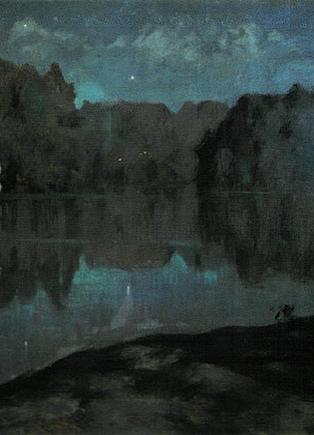Konstatin Batyushkov (1787-1855) wrote highly polished light verse, and was also an accomplished translator of French, Italian, Greek and Roman
poetry. As in this early poem, he could turn out literary trifles as the best of his generation, and there is no hint of the melancholia, depression and
incurable madness that afflicted him in later life {1-2}

There is very little needing explanation in the poem, which is not a moralizing piece but a light-hearted, bantering comment on out common failings. That being the case,
it seems best to retain the feminine rhyme, allowing its contrivances to emphasize that this is a display of verbal cleverness, not to be taken seriously.
Many of Pushkin's circle could turn their hand to these.
Разлука
Гусар, на саблю опираясь,
В глубокой горести стоял;
Надолго с милой разлучаясь,
Вздыхая он сказал:
«Не плачь, красавица! слезами
Кручине злой не пособить!
Клянуся честью и усами
Любви не изменить!
Любви непобедима сила!
Она мой верный щит в войне;
Булат в руке, а в сердце Лила,
Чего страшиться мне?
Не плачь, красавица! слезами
Кручине злой не пособить!
А если изменю… усами
Клянусь наказан быть!
Тогда мой верный конь споткнися,
Летя во вражий стан стрелой;
Уздечка браная порвися
И стремя под ногой!
Пускай булат в руке с размаха
Изломится, как прут гнилой,
И я, бледнея весь от страха,
Явлюсь перед тобой!»
Но верный конь не спотыкался
Под нашим всадником лихим;
Булат в боях не изломался —
И честь гусара с ним!
А он забыл любовь и слёзы
Своей пастушки дорогой
И рвал в чужбине счастья розы
С красавицей другой.
Но что же сделала пастушка?
Другому сердце отдала.
Любовь красавицам игрушка,
А клятвы их — слова!
Всё здесь, друзья! изменой дышет,
Теперь нет верности нигде!
Амур, смеясь, все клятвы пишет
Стрелою на воде.
1812.
The poem is written in iambics rhymed AbAb, etc.:
Гуса́р, на са́блю опира́ясь, 4A
В глубо́кой го́рести стоя́л; 4b
Надо́лго с ми́лой разлуча́ясь, 4A
Вздыха́я он сказа́л: 3b
«Не плачь, краса́вица! слеза́ми 4C
Кручи́не злой не пособи́ть! 4d
Клянуся че́стью и уса́ми 4C
Любви́ не измени́ть! 3d
A TTS Audio Recording: Opening Stanzas
Ruverses have a splendid version by
William Hendry Stowell (1800-58), a little free perhaps, and certainly dated in diction, but rendering very well the bantering nature of Batyushkov's style:
Bent o'er his sabre, torrents starting
From his dim eyes, the bold hussar
Thus greets his cherish'd maid, while parting
For distant fields of war:
'Weep not, my fair one! O forbear thee!
No anguish can those tears remove;
For, by my troth and beard, I swear thee,
Time shall not change my love.
We start with a fairly literal version, or as literal as the tight rhyme scheme will allow:
Farewell
A Hussar leaning on his sabre,
from thought to sorrows led:
in parting from his sweetest neighbour,
a long time sighed and said:
Don’t cry, my beauty, lest Kuchina
see from whence such sorrows start.
I swear by honour and appearance,
time won’t change my heart.
The power of love: unconquerable,
a faithful shield it is through war;
with Lila’s heart so comparable,
what is this fearing for?
Don’t cry, my love, be well behaved,
lest the foul Kruchina see.
Should I change, a moustache shaved
is the cost to me.
More like my faithful horse betray me,
or to the enemy would flee,
or a broken bridle would delay me,
or stirrup fail for me.
Sooner would my sword and valour
like a rotted stick would break
and I appear in death’s own pallor
before you shake and quake.
The faithful horse, it did not stumble,
and dashing was his regiment,
nor honour at the battle crumble,
though word was only lent.
Unpledged were former tears and passion,
and his own dear shepherdess forgot,
he scattered roses in the earlier fashion
to someone new he’d got.
Was that dear shepherdess to ponder?
No: she found some other breast.
So will the love in beauties wander,
when promises are jest.
So all, however vehement:
and loyalty is nowhere found,
for laughing Cupid draws the agreement
on shifting water’s round.
1812
This is rather ungainly, leaden and inept. We have to follow Stowell's example in imparting some swing and forward rhythm to the lines:
Farewell
A Hussar, on his sabre leaning,
stood as sorrow bowed his head.
on parting from the loved-one keening,
long he sighed and said:
Don’t cry, my beauty, lest Kuchina
have tears to tell where sorrows start.
I swear by honour and appearance,
I will not change this heart.
The power of love's unconquerable,
a faithful shield it stays through war;
with Lila’s heart so comparable,
what is this doubting for?
Don’t cry, my love, be well-behaved,
lest the shrill Kruchina see.
And should I change, my moustache shaved
shall serve as penalty.
More like my faithful horse betray me,
or to the enemy would flee,
some tangled bridle would delay me,
or stirrup fail for me.
Sooner would my sword and valour
like some rotten stick would break
and I appear in death’s own pallor,
in terror start to quake.
The faithful horse, it did not stumble,
still dashing rode the regiment,
nor battle saw his honour crumble,
the vow, it was, that bent.
Undone were former tears and passion,
with his dear shepherdess forgot,
so roses scattered in the earlier fashion
in some new lover's plot.
Did his own dear shepherdess long ponder,
or went she to some other breast?
So will the love in beauties wander
at promise made in jest.
So are all, however vehement:
and loyalty be far to seek,
for love is as the winds' agreement,
or water arrows speak.
1812
1. Mirsky, D.S., A History of Russian Literature (Knopf 1926 / Vintage Books 1958) 79-83.
2. Bristol, E., A History of Russian Poetry (O.U.P.) 100-2.
Russian poem translations on this site: listing.